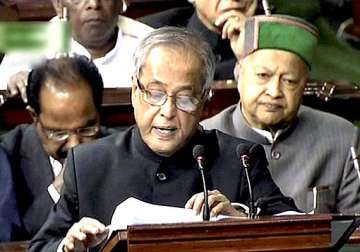New Delhi, Aug 11: Parliament today permitted the government to mint coins of Rs 1,000 denomination even as nostalgia over withdrawal of 25 paise coins (chawani) was witnessed among Rajya Sabha members.
The Coinage Bill, 2009 passed by the Upper House, limits payment by an individual through coins up to Rs 1,000, Finance Minister Pranab Mukherjee said, replying to a debate on it. The Lok Sabha had passed the bill without discussion in March.
Mukherjee said the payment and receipt by way of coins was being limited to Rs 1,000 by an individual, as suggested by the Reserve Bank, for sake of convenience.
Replying to concerns of counterfeit notes, the Minister agreed there was a serious threat. While it was a battle the government was to fight continuously, some countries are using it as a potential tool to destablise the Indian economy, he said.
“Some times it is used as a policy matter. I do not want to use the names of the country. Everybody is aware of...what is their objective,” he said.
Though the Finance Minister did not name any country, concerns have often been expressed over fake currency coming from Pakistan routed through Nepal.
On the Rs 1,000 coin, Mukherjee said at present it is only an enabling provision being inserted in the coinage law. He did not indicate when it could be introduced. While the Finance Minister shared members' nostalgia over withdrawal of 25 paise coin (chavani), he said it was part of an economic evolution. There used to be coins in the sub-unit of a paisa in the past.
The Finance Minister pointed out only eight notes out of one million have been detected to be counterfeit. He said any illegal melting of coins will attract a severe punishment of seven years' imprisonment under the Coinage Bill.
Answering a question from senior BJP leader S S Ahluwalia as to why there was a contradiction in the penal provisions between this bill and the Indian Penal Code, Mukherjee said it was “deliberate”.
It was being done to distinguish between the offences relating to the melting/scrapping of coins and the indulging in counterfeit currency.
While the measure has been vetted by the Law Ministry, the government would again consult the Attorney General for the double-check, as suggested by the BJP leader, the Finance Minister said.
Members of almost all the parties, including Congress, opposed outsourcing of the currency printing or minting of coins outside the country.
They said the bill had a provision allowing the government to import or get the currency printed abroad. The Finance Minister agreed that it was an issue of national prestige as also security.
In 1997-98, “we did import,” he said adding ,”it is odd” and a question of national prestige. The issue is in regard ink, which is manufactured by two-three companies around the world. The country is trying to achieve self-sufficiency in the manufacture of the paper used for currency printing.
On concerns over coin shortages, the minister said the country was minting 18,000 billion at four mints in Hyderabad, Mumbai, Kolkata and Noida. PTI
Latest Business News
